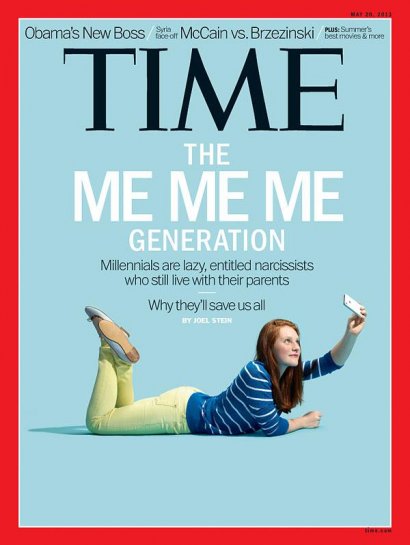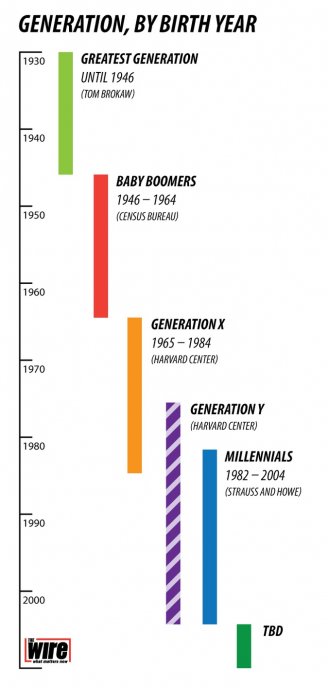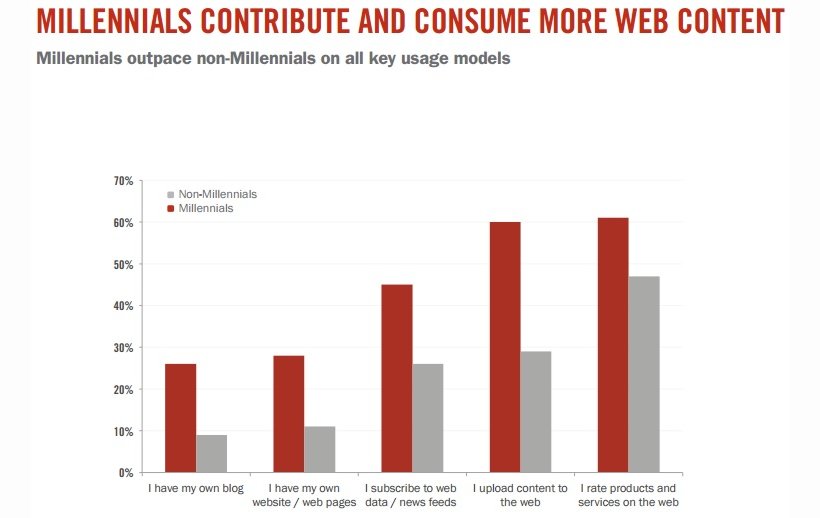Marketers just can’t seem to get enough of Millennials. And who can blame them? Millennials hold an annual spending power of around $600 billion and are currently the largest percentage of the American workforce.
There are a lot of misconceptions (and negative feelings) toward Millennials. The generation has been tagged as self-absorbed, over-privileged, and untrustworthy. Just do a Google search for “Millennial memes.” You’ll see what I mean.
Source: TIME
But, Millennials are such a diverse group of people that if you want them to love your brand, you can’t just lump them into one group for your marketing strategy.
Who Are Millennials?
In order to understand how you need to present your brand to Millennials, you first need to understand who they are.
But, defining a Millennial is extremely difficult. Not only are they an extremely diverse group, but depending on who you ask, the age range of Millennials varies.
Different sources place the Millennial generation start point between 1977 and 1985 and the end point anywhere from 2000 to 2004. That’s a huge range. But, most people agree that Millennials are between the ages of 16 and 36 (born between 1980 and 2000).
Source: The Atlantic
However, most Millennials don’t actually like being associated with the term “Millennial.” In fact, less than half of Millennials actually identify themselves as Millennial.
The Millennial generation is currently made up of individuals who are at different stages of the transition into adulthood. Because of this age range, Millennials’ needs and priorities can vary significantly.
Some members of this generation are getting ready to graduate high school, and others are graduating from college, just entering the workforce, shopping around for a house, or settling down with a family.
However, despite the age differences, there are still a few things most Millennials have in common:
- They’re Digital. Millennials aren’t afraid to own multiple complex devices, such as a smartphone, gaming console, tablet, and a laptop. This cross-channel access to the web means that Millennials are “always on,” and are considered the power users of the internet.
- They’re Optimists. 80% of Millennials still believe in the American Dream, and 97% of them are optimistic about their future.
- They’re Content Creators and Consumers. Millennials enjoy being part of the experience. They want to share their opinions through blogs and comments, so they look to connect with their favorite brands. Encouraging product reviews, brand collaborations, and other ways to engage is important.
Source: Barkley
- They’re Social. 84% of Millennials are social media users, which makes social selling an invaluable tool to add into your marketing strategy.
Millennials are also more likely than other generations to hop online and tell their friends all about what they love (or hate) about your brand. So while being on a Millennial’s good side can be wonderful for your brand, you have to monitor your online presence closely for damage control.
So, now the question is: how do you gain the loyalty of such a diverse group?
What Do Millennials Expect From Brands?
Millennials’ digital and social habits have changed the common idea of the buying cycle. Now, a lot of the buying cycle involves being influenced by others.
Source: Millennial Marketing
In the traditional buyer’s journey, consumers start with awareness and interest, and then move on to a desire that causes them to take an action and make a purchase.
But Millennials aren’t as passive of an audience; they don’t go straight to an action after their interest is captured. Instead, they turn to their friends and online networks to ask for opinions and recommendations. Then, after the purchase, they’ll share their experience on the same networks they used to research in the beginning.
40% of Millennials will return to brands they know and trust. So what do they expect from the brands they pledge their loyalty to?
- Authenticity. They expect brands to genuinely care about customers. Millennials want to be spoken to, not at, and 49% of Millennials have said that they are very or somewhat interested in human interaction after clicking a business’ ad.
As the most educated generation in American history, they also expect valuable content and information that makes your brand look and feel like an expert in your industry.
Plus, after the purchase, Millennials still expect an ongoing relationship with the brands they choose. It’s what keeps them going back to the brands they trust for future interactions.
- Valuable Offers. To remain loyal, Millennials expect enticing and personalized promotions in return. 95% of Millennials say they want brands to actively court them with coupons sent through mail or email.
- Seamless Experience. Millennials are generally very tech savvy, so many of them expect a seamless, omni-channel experience. Most prefer a fulfilling digital experience, like having coupons accessible on their phones, instead of having to print them out.
- A Brand Cause. Millennials are one of the most compassionate generations in regard to social issues, so they’re more likely to purchase from a brand that supports a worldly cause. In fact, 37% of Millennials are willing to pay a little bit more for a product if it means supporting a cause they believe in.
How Can You Market to Millennials?
Traditional, outbound marketing isn’t going to work with Millennials. Millennials will support businesses and companies that are dedicated to improving the lives of their customers, not brands who are only out for their own self-gain. They want quality information that will help them solve their problems, whether it be a step-by-step how-to video or a comprehensive ebook.
The easiest way to reach Millennials? Social media. But if you want to be a brand that stands out, you’ll have to get creative.
In a recent study by eZanga to find out how consumers really feel about ads, we found that Millennials were the most neutral to advertisements. In fact, only 20% were likely to click on sponsored content. Basically, Millennials want to feel as if sponsored and organic content was created for them, and not their wallets.
Millennials, and most consumers, trust companies that produce content and advertisements that feel authentic.
They may be a digital generation, but Millennials still like to shop in traditional brick-and-mortar stores. No matter where they’re shopping, though, they don’t like the traditional experience.
For Millennials, shopping is now more for entertainment than necessity. Shopping online is more of an exploration than a means to an end — the search is now half the fun.




